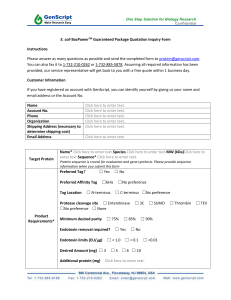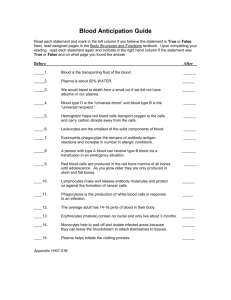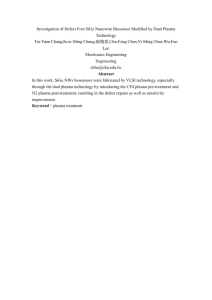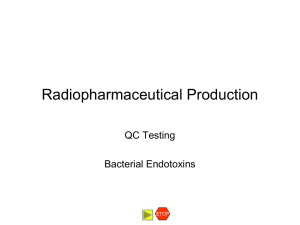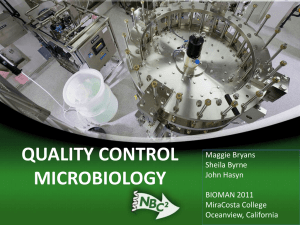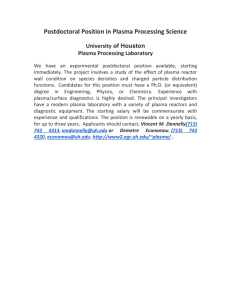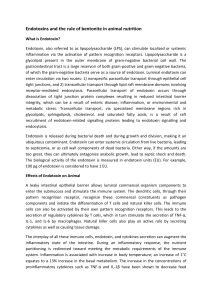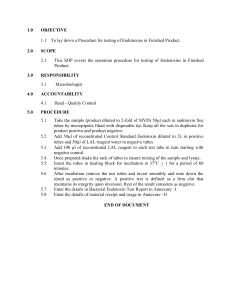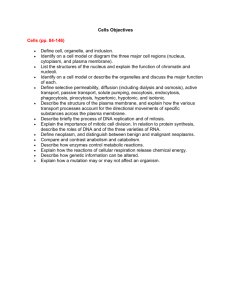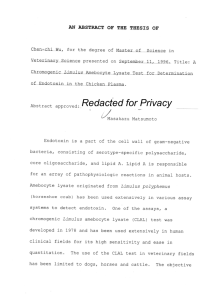Eltayb A. M. Aboubaker
advertisement
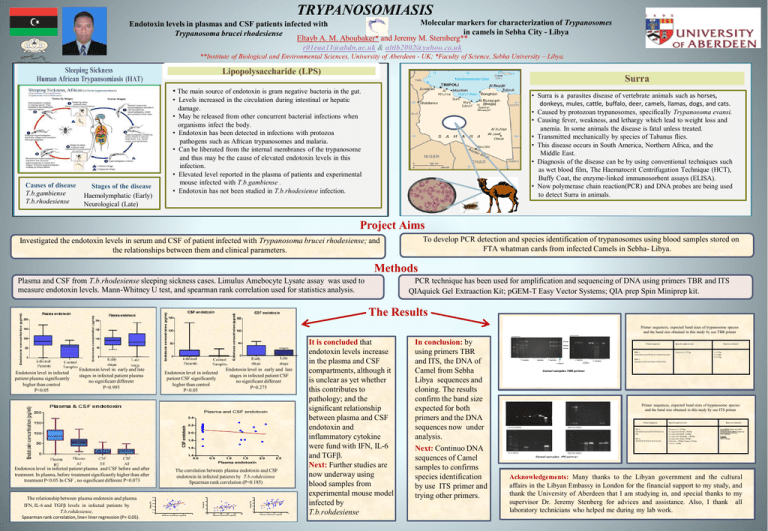
TRYPANOSOMIASIS Molecular markers for characterization of Trypanosomes Endotoxin levels in plasmas and CSF patients infected with in camels in Sebha City - Libya Trypanosoma brucei rhodesiense Eltayb A. M. Aboubaker* and Jeremy M. Sternberg** r01eaa11@abdn.ac.uk & altib2002@yahoo.co.uk **Institute of Biological and Environmental Sciences, University of Aberdeen - UK; *Faculty of Science, Sebha University – Libya. Lipopolysaccharide (LPS) Surra • The main source of endotoxin is gram negative bacteria in the gut. Causes of disease T.b.gambiense T.b.rhodesiense • Surra is a parasites disease of vertebrate animals such as horses, donkeys, mules, cattle, buffalo, deer, camels, llamas, dogs, and cats. • Caused by protozoan trypanosomes, specifically Trypanosoma evansi. • Causing fever, weakness, and lethargy which lead to weight loss and anemia. In some animals the disease is fatal unless treated. • Transmitted mechanically by species of Tabanus flies. • This disease occurs in South America, Northern Africa, and the Middle East. • Diagnosis of the disease can be by using conventional techniques such as wet blood film, The Haematocrit Centrifugation Technique (HCT), Buffy Coat, the enzyme-linked immunosorbent assays (ELISA). • Now polymerase chain reaction(PCR) and DNA probes are being used to detect Surra in animals. • Levels increased in the circulation during intestinal or hepatic damage. • May be released from other concurrent bacterial infections when organisms infect the body. • Endotoxin has been detected in infections with protozoa pathogens such as African trypanosomes and malaria. • Can be liberated from the internal membranes of the trypanosome and thus may be the cause of elevated endotoxin levels in this infection. • Elevated level reported in the plasma of patients and experimental mouse infected with T.b.gambiense . • Endotoxin has not been studied in T.b.rhodesiense infection. Stages of the disease Haemolymphatic (Early) Neurological (Late) Project Aims To develop PCR detection and species identification of trypanosomes using blood samples stored on FTA whatman cards from infected Camels in Sebha- Libya. Investigated the endotoxin levels in serum and CSF of patient infected with Trypanosoma brucei rhodesiense; and the relationships between them and clinical parameters. Methods Plasma and CSF from T.b.rhodesiense sleeping sickness cases. Limulus Amebocyte Lysate assay was used to measure endotoxin levels. Mann-Whitney U test, and spearman rank correlation used for statistics analysis. PCR technique has been used for amplification and sequencing of DNA using primers TBR and ITS QIAquick Gel Extraaction Kit; pGEM-T Easy Vector Systems; QIA prep Spin Miniprep kit. The Results Primer sequences, expected band sizes of trypanosome species and the band size obtained in this study by use TBR primer 05/04/2013 21/03/2013 Endotoxin level in infected patient plasma significantly higher than control P<0.05 Endotoxin level in early and late stages in infected patient plasma no significant different P=0.995 Endotoxin level in early and late stages in infected patient CSF no significant different P=0.275 Endotoxin level in infected patient CSF significantly higher than control P<0.05 Plasma and CSF endotoxin CSF endotoxin 2.4 2.2 2.0 1.8 1.6 1.4 0.0 0.5 1.0 1.5 2.0 2.5 Plasma endotoxin Endotoxin level in infected patient plasma and CSF before and after treatment. In plasma, before treatment significantly higher than after treatment P<0.05 In CSF , no significant different P=0.073 5 4 Plasma IL6 2.2 2.0 1.8 4 3 Plasma TGF 2.4 Plasma IFN The relationship between plasma endotoxin and plasma IFN, IL-6 and TGFβ levels in infected patients by T.b.rohdesiense. Spearman rank correlation, line= liner regression (P< 0.05). The correlation between plasma endotoxin and CSF endotoxin in infected patients by T.b.rohdesiense Spearman rank correlation (P=0.185) 2 1 1.6 1.4 0 1 2 3 Plasma endotoxin (pg/ml) 4 0 1.4 3 2 1 1.6 1.8 2.0 2.2 Plasma endotoxin (pg/ml) 2.4 0 1.4 1.6 1.8 2.0 2.2 Plasma endotoxin (pg/ml) 2.4 It is concluded that endotoxin levels increase in the plasma and CSF compartments, although it is unclear as yet whether this contributes to pathology; and the significant relationship between plasma and CSF endotoxin and inflammatory cytokine were fund with IFN, IL-6 and TGFβ. Next: Further studies are now underway using blood samples from experimental mouse model infected by T.b.rohdesiense In conclusion: by using primers TBR and ITS, the DNA of Camel from Sebha Libya sequences and cloning. The results confirm the band size expected for both primers and the DNA sequences now under analysis. Next: Continuo DNA sequences of Camel samples to confirms species identification by use ITS primer and trying other primers. 177bp Primer sequences 354bp Specific amplicon sizes Band size obtained 531bp TBR 1: CGAATGAATATTAAACAATGCGCAGT ________ ___________ _____ + Samples - Samples + Samples + Control ________ + Control _____ - Control ___________ + Samples T.brucei s.l. 177 bp 1=177bp 2=354bp 3=531bp TBR 2: AGAACCATTTATTAGCTTTGTTGC Camel samples TBR primer Primer sequences, expected band sizes of trypanosome species and the band size obtained in this study by use ITS primer Primer sequences ITS 3: GGAAGCAAAAGTCGTAACAA GG ITS 4: TGTTTTCTTTTCCTCCGCTG Specific amplicon sizes T.brucei s.l. :1215bp T.congolense Forest : 1501bp T.congolense Kilift : 1430bp T.congolense Savannah : 1408bp T.congolense Tsava : 951bp T.theilerie : 998bp T.simiae : 847bp T.vivax : 620bp Band size obtained 1.1.p DNA band size 1000. T.evansi cell culture band size 900-1000bp Camel: 900-1100bp Acknowledgements: Many thanks to the Libyan government and the cultural affairs in the Libyan Embassy in London for the financial support to my study, and thank the University of Aberdeen that I am studying in, and special thanks to my supervisor Dr. Jeremy Stenberg for advices and assistance. Also, I thank all laboratory technicians who helped me during my lab work.
